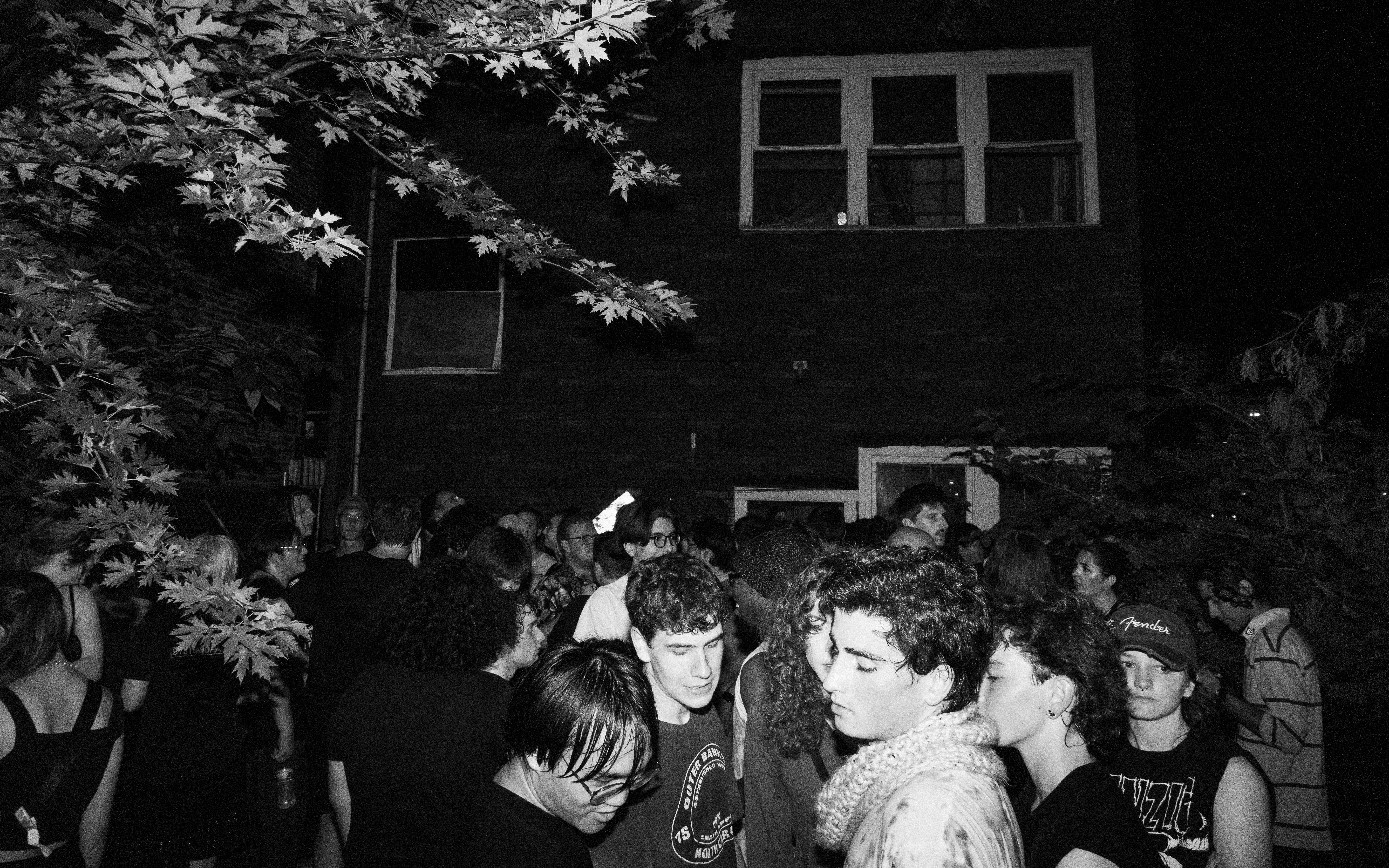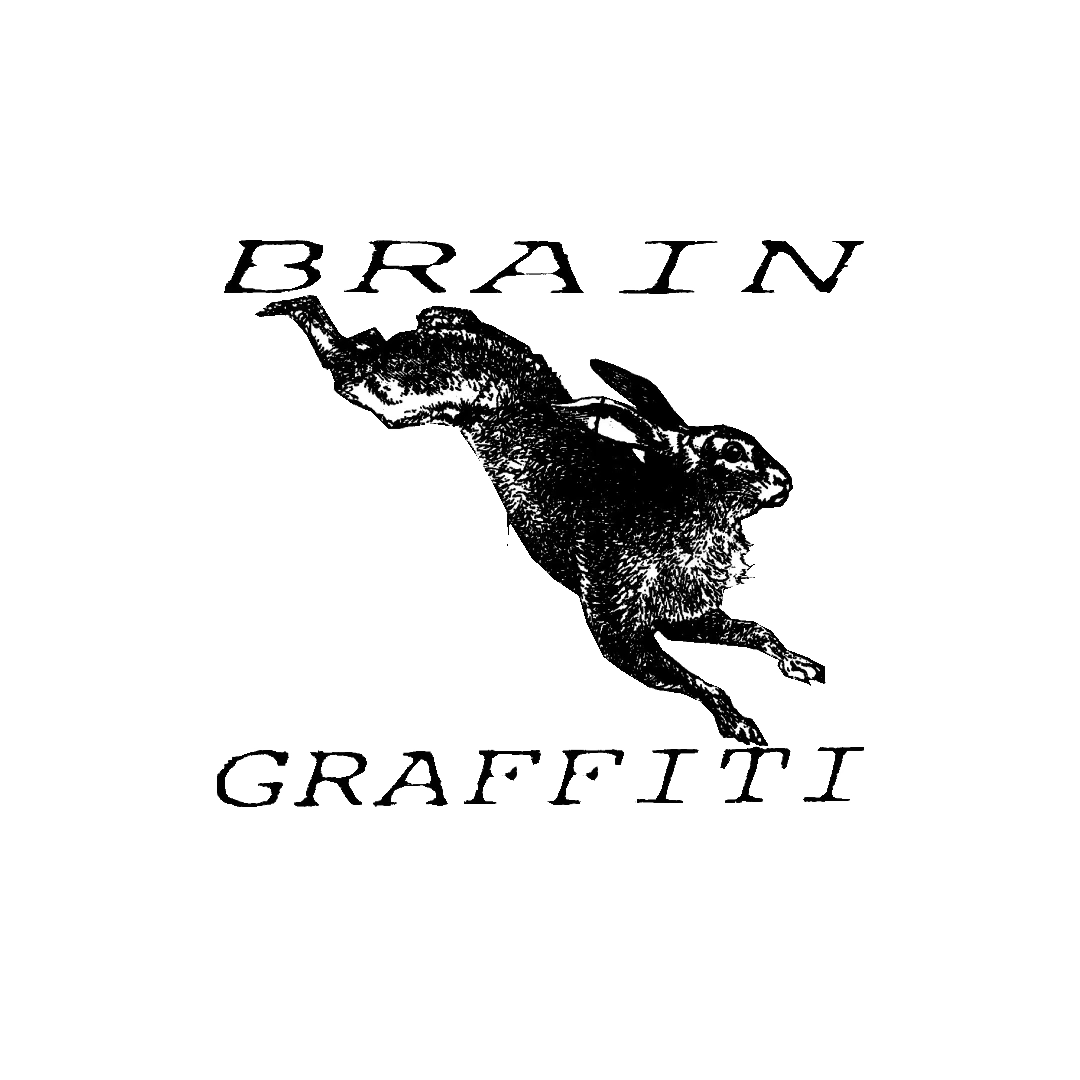On a hot August night on Chicago’s west side, the fenced-off backyard of an old, dilapidated building was brimming with enthusiastic young punks waiting in a line. Cigarettes and alcohol were shared as the people running the door marked hands with black Sharpies and checked IDs. Once inside the building, the shotgun-style first floor led to an unventilated backroom lit up by a single bulb that hung from the ceiling.
Against the back wall, a drum kit, a bass and guitar amp and a microphone were set up. The line outside the building was waiting to get into a punk show. Lot49 was the name of this space- and it was raided and shut down by the Chicago Police Department on Halloween of 2024.
Quietly carved out across different neighborhoods of Chicago are independent DIY music venues- basements, art galleries, warehouse spaces, studio apartments and already existing businesses that host punk rock-esque shows for the city’s thriving underground music community. These spaces are not your typical music venue, where 15 hulking security guards block the artist from the crowd and your favorite alcoholic beverage costs $25. At these DIY shows, bands perform crowd level without a barricade, sharing the mixed aromas of beer, sweat, cheap weed and BO with the audience.
What most of these spaces lack, though, are the proper licenses and permits to host these events.
Through “Brain Graffiti,” we have worked with many of these DIY music venues across the city: coordinating dates to host shows, getting bands to play, getting flyers made and promoting all the way up to the day of the gig.
Between doing all of these tasks and working extensively with the owners of these DIY establishments, a specific question has lingered in my mind: What are the risks of running shows like this, and why even run these risks?
Haz Cooperative Studios is an artist-owned art gallery that shifted from unknowingly lacking licenses to throw DIY-style shows to navigating the tedious two-year process of acquiring a Public Place of Amusement (PPA) license- the required documentation for music venues in Chicago (not counting the countless others, such as liquor and food). Furthermore, shows become “illegal when an admission fee is collected, liquor is sold or the event is advertised to the public without the proper licensing.”
Andrew Tschiltsch, co-founder and “day-to-day” operations man, founded the Pilsen space alongside two other colleagues behind the idea of a “shared resource house,” where artists who lack the necessary funding to grow their creativity can find solace in the resources available through Haz. With the city’s underground music roots already cemented in Tschiltsch alongside the philosophy of the new business, Haz began throwing DIY shows, believing that they were following the rules (under a hundred people with no fee charged at the door).
A visit from bulletproof-vested officers from the License Enforcement Agency made Tschiltsch and co. release that they were, unintentionally, not following the rules, leading to a confusing, back-and-forth process between Business Affairs and Consumer Protection, zoning lawyers, and their Alderman to acquire the PPA, which they received earlier this year.
“Also part of this whole process is that you have to work with the local police commissioner to come up with a plan for your operations,” Tschiltsch said. “And we met with neighbors to kind of work on a plan that works for them.”
Lot49 publicly hosted shows for a year, from fall 2023 to their subsequent shutdown in fall 2024. Marteen, who wished to have his last name remain anonymous, was one of the artists who lived at the space as well as helped facilitate the shows, from running the door and taking entry fees to manning the bar and making sure all attendees were taken care of.
He was a bona fide host for the occasion.
“For every big event that we did where a bunch of people came out, we also did film screenings for a political socialist organization, art events and our friend’s band practiced there,” he said. “It was pretty communal and we never really had any issues."
Lot49 was not sanctioned by the city, meaning that the artist-run venue did not hold a PPA or any other licenses or permits. With any type of risk possible at these shows, from mosh pits gone awry to someone hitting their head or breaking a bone, a pretty hefty ticket could be given by law enforcement. At first, Marteen and company weren’t too wary of the risks, as they were always cautious with hosting shows and kept a watchful eye out. “We each [had] our own skill set and everything, so I think we never had any major issues,” he said.
Their Halloween show was packed to the brim with attendees, and the night showed promise of a gig to remember for months to come, only to be broken by the white heat of police flashlights breaking through the heads of audience members, bringing the night to a sour end.
“The [police were] taking drinks, but trying to do it in this purposefully, like, aggressive way to get the crowd riled up,” Marteen said.
The raid ended with audience members going home and a hefty ticket of $10,000 laid upon the owners.
So, why run a space if the risks of shutdowns and tickets are so prevalent?
Moshing and spin-kicking extraordinaire Dylan Simpson views this subculture as his second home. Through these music spaces, he was able to make new friends and connect with other like-minded audience members, no matter the genre of music the show catered to. Whether he’s bobbing his head at a shoegaze show or crowdkilling at a hardcore Bricktown show, he’s always respecting the space he’s in.
“I can get away from all the bull crap in life and just let loose, enjoy myself and the company around me,” he said. “These spaces are the biggest getaway for me in life, and I hands down have some of the best times there.
Other showgoers feel the same way as Simpson. If it weren’t for these music spaces, Karina Avitia, another frequent showgoer, would have eventually lost passion to create and submitted to working a dead-end job. Though shy at first, Avitia realized that the community is full of welcoming people, all filled with a passion to create and uplift one another.
“It quickly became my new home,” she said.
To Marteen, DIY spaces are a way to open doors for artists and allow other like-minded creatives to connect and build community. Through running Lot49, Marteen felt that working together as a collective was fulfilling. “The biggest reward is giving a stage to perform,” Marteen said. “For every Scarlet Demore and bigger band that played, there were plenty of artists that [Lot49] was their first show.”
After meetings with a lawyer to get their tickets down to $1500, the owners of Lot49 got together to host a fundraiser show at Bricktown, another Chicago DIY staple, where enough money was raised to pay the remaining ticket and legal fees.
In terms of the future of Lot49, “DM for address” shows will be put to bed.
“I don’t think we’ll do anything like that again,” Marteen said. “It’ll just continue to live in a different way.”
Tschiltsch views these spaces as a way to create culture and a way to bring people together. With a city that’s crawling with venues mostly dependent on bar sales and, in turn, hosting age-restricted shows, DIY offers a healthier alternative to those archetypes of music spaces.
“You’re bringing a community of people that are a little more like minded than you, and you’re not worried about pissing off some bar venue that doesn’t know what you are,” he said. “All they care about is how many people you brought.”
Being from California and settling in Chicago, Tschiltsch believes that punk culture is a vital part of the city and that DIY music spaces create accessibility for all ages without being hindered by an established venue.
“Having spaces for that is super vital,” he said. “There’s so much art and talent bubbling up, and people have good heads on their shoulders in terms of what art means to political and cultural movements.”
The Brain Graffiti Zine substack is free and we’re so happy to be able to provide cool stories to people who are interested without a pay wall. We do, though, have a physical zine that we are super passionate about.
If you are interested in buying and supporting, click this print link to purchase an issue!







Nice piece, Matt ✊️
I love you for writing this Matt. I just love you.